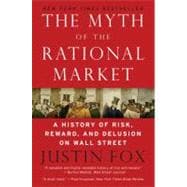
| Introduction: It Had Been Working So Exceptionally Well | p. xi |
| Early Days | |
| Irving Fisher Loses His Briefcase, and Then His Fortune | p. 3 |
| The first serious try to impose reason and science upon the market comes in the early decades of the twentieth century. It doesn't work out so well. | |
| A Random Walk from Fred Macaulay to Holbrook Working | p. 26 |
| Statistics and mathematics begin to find their way into the economic mainstream in the 1930s, setting the stage for big changes to come. | |
| The Rise, of the Rational Market | |
| Harry Markowitz Brings Statistical Man to the Stock Market | p. 47 |
| The modern quantitative approach to investing is assembled out of equal parts poker strategy and World War II gunnery experience. | |
| A Random Walk from Paul Samuelson to Paul Samuelson | p. 60 |
| The proposition that stock movements are mostly unpredictable goes from intellectual curiosity to centerpiece of an academic movement. | |
| Modigliani and Miller Arrive at A Simplifying Assumption | p. 75 |
| Finance, the business school version of economics, is transformed from a field of empirical research and rules of thumb to one ruled by theory. | |
| Gene Fama Makes the Best Proposition in Economics | p. 89 |
| At the University of Chicago's Business School in the 1960s, the argument that the market is hard to outsmart grows into a conviction that it is perfect. | |
| The Conquest of Wall Street | |
| Jack Bogle Takes on the Performance Cult (And Wins) | p. 111 |
| The lesson that maybe it's not even worth trying to beat the market makes its circuitous way into the investment business. | |
| Fischer Black Chooses to Focus on the Probable | p. 132 |
| Finance scholars figure out some ways to measure and control risk. More important, they figure out how to get paid for doing so. | |
| Michael Jensen Gets Corporations to Obey the Market | p. 153 |
| The efficient market meets corporate America. Hostile takeovers and lots of talk about shareholder value ensue. | |
| The Challenge | |
| Dick Thaler Gives Economic Man A Personality | p. 175 |
| Human nature begins to find its way back into economics in the 1970s, and economists begin to study how markets sometimes fail. | |
| Bob Shiller Points Out the Most Remarkable Error | p. 191 |
| Some troublemaking young economists demonstrate that convincing evidence for financial market rationality is sadly lacking. | |
| Beating the Market with Warren Buffett and Ed Thorp | p. 211 |
| Just because professional investors as a group can't reliably outperform the market doesn't mean that some professional investors can't. | |
| Alan Greenspan Stops A Random Plunge Down Wall Street | p. 227 |
| The crash of 1987 exposes big flaws in the rational finance view of risk. But a rescue by the Federal Reserve averts a full reexamination. | |
| The Fall | |
| Andrei Shleifer Moves Beyond Rabbi Economics | p. 247 |
| The efficient market's critics triumph by showing why irrational market forces can sometimes be just as pervasive as the rational ones. | |
| Mike Jensen Changes His Mind About the Corporation | p. 265 |
| The argument that financial markets should always set the priorities-for corporations and for society-loses its most important champion. | |
| Gene Fama and Dick Thaler Knock Each Other Out | p. 287 |
| Where has the debate over market rationality ended up? In something more than a draw and less than a resounding victory. | |
| Epilogue: The Anatomy of A Financial Crisis | p. 309 |
| Afterword | p. 323 |
| Cast of Characters | p. 329 |
| Acknowledgments | p. 337 |
| A Note on Sources | p. 339 |
| Notes | p. 341 |
| Index | p. 379 |
| Table of Contents provided by Ingram. All Rights Reserved. |
The New copy of this book will include any supplemental materials advertised. Please check the title of the book to determine if it should include any access cards, study guides, lab manuals, CDs, etc.
The Used, Rental and eBook copies of this book are not guaranteed to include any supplemental materials. Typically, only the book itself is included. This is true even if the title states it includes any access cards, study guides, lab manuals, CDs, etc.